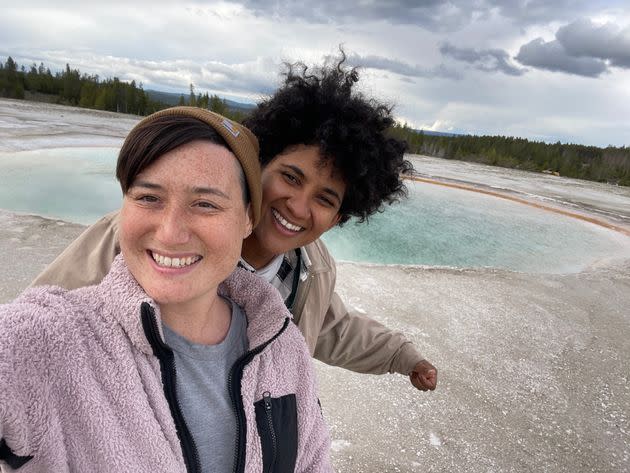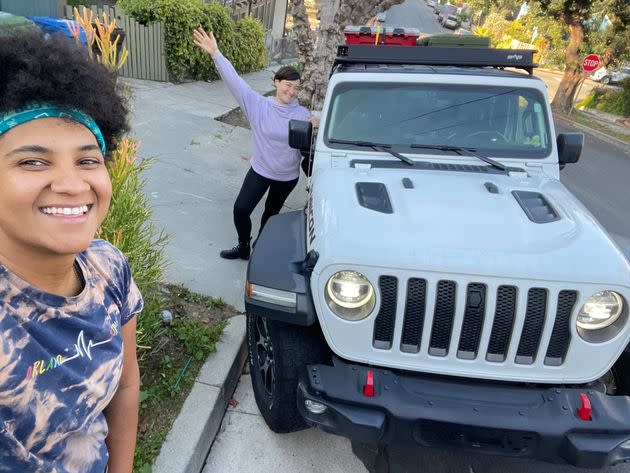As Queer People, Do We Have To Be Influencers To Heal Our Community?

Author Bex Mui (left) with partner Cheryna Guzman (right).
Lastspring,my fiancée, Cheryna, and I took a cross-country journey the best way lesbians know how: by adding an air mattress to our Jeep Wrangler. I was celebrating the release of “House of Our Queer,”a memoir-meets-advice-book that details my experience being raised culturally Catholic by my Polish mom, with Buddhist influences from my Chinese father — and how all of that informed the creation of my own spiritual rituals. We decided to spend three months leaving the queer city life of Oakland to host talks in queer-friendly indie bookshops across the country.
A few months after our return, I was left wondering, was it work? Was it a break? Was it one of those Gen Z-style hybrid work-ations?
Whatever it was, the trip served as a major turning point for my career. For years, I’d been focusing on national LGBTQ advocacy through nonprofit and consulting work, tracking anti-LGBTQ policies, and working with school and business leaders to make more inclusive and affirming spaces. When COVID restrictions raged in the spring of 2020, I wasn’t able to perform the tasks that involved a lot of travel.
And so, in that forced grounding, that quiet, I shifted gears and finally listened to the work that I felt was calling me. At the start of 2021, I launched House Of Our Queer, a spiritual playspace and project where I could share healing offerings and build community. The book tour was my pivot to completely focusing on spiritual organizing.
Over the years, I’ve grown so accustomed to sharing my story and talking about my identities through public-facing work that this turning point didn’t feel like much of a pivot at first. I’ve called myself a “professional queer” since 2016, an ironic twist since my parents’ major fear for my coming out was never being able to be hired (a typical concern for immigrant parents of a certain generation). There was a rush of immense relief when I was hired into LGBTQ advocacy as the education manager of a national nonprofit. I was hired because of who I was. Suddenly my story and my life were professional assets. I was living proudly and publicly.
For five years in this work, I was able to share my story and be “on brand.” Working within an organization helped me to be me, but within guidelines and codes of conduct. I had my personal opinion, but when I spoke or wrote publicly, I had a mission statement to guide me. It was me, and it wasn’t all me. There was comfort in this container. And there were challenges to my own authenticity and who I was allowed to be to remain “professional.”
Looking back to that era of my life now, I see that much of that editing was self-imposed and part of my own perfectionism, my socialization to be a “good Chinese girl” and the safety that I felt as someone else’s representative.
Last spring’s book tour marked the end of that era for me. As an ex-Catholic, that fear of excommunication has deep roots. Maybe that’s why it felt so damn good to be sharing as myself on the road trip, and to have a platform whose only guidelines for my story were my own.
It was easy, during these three months, to document where I was and what I was doing. I was lucky to have a publisher who supported my boundaries of how often I’d post. After coming back, however, I’ve felt a growing pressure to “create content.” I’ve had to reflect on when I’m using the platform to connect and build community, and when I’m packaging myself up into bite-sized samples.
I realized that even though I felt new freedom as my own boss, sharing from my own project, I still felt a pressure to present my life to the world in a certain way. Was that ever escapable, as an out-here queer person trying to support my community?
As LGBTQIA people, social platforms create an opportunity for us to find each other and build community beyond what we are able to do IRL, even in major, queer-affirming cities. And they also have challenging and slanted algorithms that can leave us buried. Doing this work for the gram vs. on the gram can be a thin line.
With House of Our Queer, I post a near-weekly IG live called “Queer Church,” where I share a reading and astrology update, among other things. This offering helps with one of the major goals I have as a spiritual organizer: to help us keep track of time in community. I can feel the difference between the weeks when this live video flows freely, lifting me up and starting my own week with more clarity, and the weeks when I’m wondering if the lighting is rightor distracted by people leaving halfway through.
If social platforms are ways for queer people and folks in marginalized groups to reach out, connect, and share our work, does that make posts our currency? I can’t help feeling I’m falling into the trap of working twice as hard as others just to “earn my place at the table” — or to earn my rest. It’s healing community work, indeed, but do I have to be an influencer for my work to have meaning?
When are we, as queer people, allowed to do something just for us?
In the midst of this exploration, I had to admit that I’m always pushing Cheryna to turn her love of Jeeps into advocacy work. There’s a lack of visibility around women, especially Black and brown queer women in the outdoors, that part of me tries to make every trip we take into a community organizing opportunity, every post she makes into healing “content.”
She’s not interested.

Author Bex Mui (right) with partner Cheryna Guzman (left).
Cheryna loves her Jeep, finding trails, and being with the trees. She’s content with being a self-proclaimed Dominican butch in the woods. She posts and shares her stories only when she feels like it, mostly for her own memories.
I thought back to the road trip, and how Cheryna got me into caving, something my claustrophobic self never expected. We found caves in Texas, Kentucky, Wisconsin and Idaho. We listened to tour guides who were clearly living their best lives sharing the histories of the caves. Some of them turned off the lights so we could experience the darkness, appreciate the bravery of the Native inhabitants and first explorers.
All of my pictures in the caves are trash. The caves are too big to fully capture on my iPhone, the lighting impossible to hold the awe. But these just-us experiences are some of my favorite from this three-month adventure. Those dark, underground, unexpected moments are the ones that have stuck with me, along with the memories of all that I could hear in that quiet.
For me, the start of this new year spiritually hinges on what I call our pandemic truths, the insights that came up during the quiet of 2020. I feel more connected to the origins of my organizing, and my New Year’s resolutions are clear: I won’t be fitting into a social media box, I will indulge in rest profusely, and I will remember that I don’t have to be an influencer for my work to resonate.

